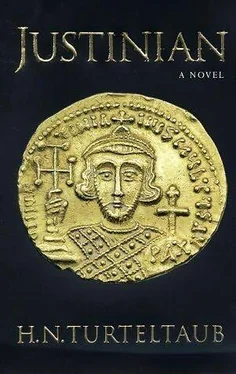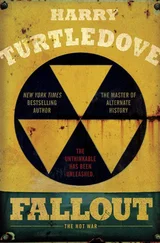Harry Turtledove - Justinian
Здесь есть возможность читать онлайн «Harry Turtledove - Justinian» весь текст электронной книги совершенно бесплатно (целиком полную версию без сокращений). В некоторых случаях можно слушать аудио, скачать через торрент в формате fb2 и присутствует краткое содержание. Жанр: Историческая проза, на английском языке. Описание произведения, (предисловие) а так же отзывы посетителей доступны на портале библиотеки ЛибКат.
- Название:Justinian
- Автор:
- Жанр:
- Год:неизвестен
- ISBN:нет данных
- Рейтинг книги:3 / 5. Голосов: 1
-
Избранное:Добавить в избранное
- Отзывы:
-
Ваша оценка:
- 60
- 1
- 2
- 3
- 4
- 5
Justinian: краткое содержание, описание и аннотация
Предлагаем к чтению аннотацию, описание, краткое содержание или предисловие (зависит от того, что написал сам автор книги «Justinian»). Если вы не нашли необходимую информацию о книге — напишите в комментариях, мы постараемся отыскать её.
Justinian — читать онлайн бесплатно полную книгу (весь текст) целиком
Ниже представлен текст книги, разбитый по страницам. Система сохранения места последней прочитанной страницы, позволяет с удобством читать онлайн бесплатно книгу «Justinian», без необходимости каждый раз заново искать на чём Вы остановились. Поставьте закладку, и сможете в любой момент перейти на страницу, на которой закончили чтение.
Интервал:
Закладка:
Had we had time to make these movements, we might have managed them and saved the battle. But the prince Mouamet, having suborned Neboulos and the Sklavenoi, anticipated the effect of their defection and struck hard into the gap that defection had created. His horsemen, still screaming "Allahu akbar!" as if possessed by demons, stormed at what had been the center of our line and broke through, splitting the Roman army in half.
I had practiced with the sword. Any Emperor with a grain of sense will do as much, in case an assassin should get past his guards or in case those guards should turn against him, as happened to my unfortunate grandfather in the bathhouse on the island of Sicily. But I never thought to have to engage in swordplay in such desperate circumstances.
The Arabs, recognizing my regalia, made for me in large numbers. Being mounted, they overbore many of the excubitores who tried to stand in their way, and, had I not fought, I would surely have been slain or, perhaps worse, captured, a humiliation that had not befallen a Roman Emperor since the days of the luckless Valerian, who ruled two generations before the time of Constantine the Great.
"Die!" one of the followers of the false prophet screamed at me- in Greek, so I could understand and fear. He cut at my head. When I turned his stroke, sparks flew from our blades. Then I cut at him. His swarthy, bearded face took on an expression of absurd surprise, as if it had never occurred to him that I might do such an untoward thing. Barely in time, he parried.
"Christ with me!" I shouted, and spurred toward him. My horse was bigger than his. The two of them colliding, his had the worse of it, throwing him off balance. I slashed again. My sword bit. Blood sprayed from his wound, at the joining of his shoulder. He yowled, as a cat will if its tail is stepped on, and clutched at the injury. I smote him again, this time across the face. Features a gory mask, he pitched headlong from the saddle.
"Justinian!" cried the excubitores who were near me- though not near enough to have kept that wretch from assailing me. He was the first man I ever killed with my own hands. Seeing him fall, knowing I had overcome him, hearing the guardsmen acclaim me, made warm satisfaction surge through me, almost as if I had just had a woman.
Another Arab came trotting toward me. This time, not waiting for his onslaught, I set spurs to my own horse and myself attacked. That startled him; he must have reckoned me as sly and cowardly as his own leaders. He soon learned his error. After a sharp, hard fight, I beat down his guard and wounded him first in the arm, then in the side, and then in the neck. Blood streaming from him and staining his white robes, he turned his horse, fleeing for his life.
By then, the excubitores had rallied, once more forming a solid circle around me. Cavalrymen from the military districts also helped drive the followers of the false prophet away from my person. For a brief, heady moment, I thought we might yet win the battle.
But that was not to be, the Arabs having split us in two. Each half of the army defended itself as best it could. Both halves, I daresay, would have gone down to destruction had the deniers of Christ exerted themselves against us. Instead of doing so, though, a great many of them poured through the gap in our line not to attack us but to plunder our camp, which lay less than a mile behind the battlefield. Their officers must have screamed and cursed and invoked their false prophet scores of times, trying to hold the men to their principal task, but in vain.
Seeing that, I tried once more to rally the Romans, shouting, "Strike a hard blow, men! Don't let them steal not only the victory but also your goods!"
No one rode forward against the Arabs. Myakes stood close by me, though I did not recognize him till he spoke, a blow having smashed his helmet down over one ear and driven the brim against his forehead so that blood poured down his face. He said, "It's no use, Emperor. If we manage to save ourselves, we ought to get down on our knees and thank God for that much. A plague take everything else- we can always get more stuff."
He was, unfortunately, correct, I realized. I have never been one to go any way but forward, but his words forced me to recognize the difference between going forward with some hope, no matter how small, of success and throwing my life away as surely as if I were slitting my own throat and damning myself as a suicide. "We'll fall back," I said, the words bitter as aloes in my mouth.
And fall back we did, still resisting attack from the front and using some soldiers not engaged there to form a line defending against attacks from our left flank. These, thanks to the mercy of God, were less severe than they might have been, the Arabs being more interested in plunder than in further fighting once our defeat was manifest. Assaults against me also eased as more Roman soldiers placed themselves between me and the foe.
Saving our camp, saving our belongings, I saw at a glance, was hopeless. "We'll make for Sebastopolis!" I shouted to the excubitores and the horsemen from the military districts. "Once we get behind the walls of the town, we can defend ourselves from the deniers of Christ. If they go blithely plundering the countryside, we'll sally forth and teach them the lesson they should have had on this field." Beaten though I was, I looked toward eventual triumph. That trait availed me little here, but would serve me well in days to come.
My greatest fear was that this half of the army would simply dissolve around me, the men fleeing this way and that, leaving themselves easy meat for the Arabs. They must have perceived the danger there, though, and realized their best hope for bodily salvation lay in sticking together. Very few deserted our mass. The fate of those who did- they being quickly snapped up by the enemy- helped persuade the rest not to bolt.
After we had retreated past our camp, swinging wide to the south to traverse it at a safe distance, the pressure against us eased. "Let the cursed Arabs have my bedroll and my cot and my tent," Myakes said. "They don't have me. One of these days I'll get those things back again, or others even better."
More than a thousand years before, the poet Arkhilokhos had sung the same song, having thrown away his shield to escape the barbarous Thracians. In the words of the historian Menander Protector, who recorded the deeds of the first Justinian and his successors, "The changing circuit revealed such things before our time, and will reveal them again, and the revelations shall not cease, so long as there be men and battles."
The sun had nearly set by the time we approached Sebastopolis. As we drew near its protecting walls and towers, the men cried out in dismay, for they saw, as did I, another army moving rapidly toward the city from the north east. I sent out scouts to hold off the enemy while the rest of us gained safety. These men soon came riding back, not in headlong retreat but shouting for joy: the other army did not belong to the followers of the false prophet, but was in fact our own left wing, also falling back on Sebastopolis.
Commanding them was Leontios. I had rather hoped, considering his sorry performance in the battle itself, that the Arabs had made away with him. God, however, was not so kind. And not only had Leontios brought that half of the cavalry from the military districts out of the fight, but also the several thousand Sklavenoi who had neither fallen to the Arabs nor gone over to them. That struck me as wasted effort. Their fellow tribesmen having proved themselves traitors, how likely was I ever to trust these barbarians again with weapons in hand?
Still, for the moment, the Sklavenoi were a more welcome sight than Arabs would have been. In the failing light, it took us some small effort to persuade the garrison within Sebastopolis we were in fact Romans and not deniers of Christ attempting a ruse. I finally had to approach the walls and shout up a warning about what would happen to those garrison soldiers if they did not open the gates and admit us forthwith. Enough of them had heard and seen me to be convinced, which was as well, for I meant every word of my threats. The gates opened. The army on which I had pinned such hopes passed within, beaten but for the moment secure.
Читать дальшеИнтервал:
Закладка:
Похожие книги на «Justinian»
Представляем Вашему вниманию похожие книги на «Justinian» списком для выбора. Мы отобрали схожую по названию и смыслу литературу в надежде предоставить читателям больше вариантов отыскать новые, интересные, ещё непрочитанные произведения.
Обсуждение, отзывы о книге «Justinian» и просто собственные мнения читателей. Оставьте ваши комментарии, напишите, что Вы думаете о произведении, его смысле или главных героях. Укажите что конкретно понравилось, а что нет, и почему Вы так считаете.












